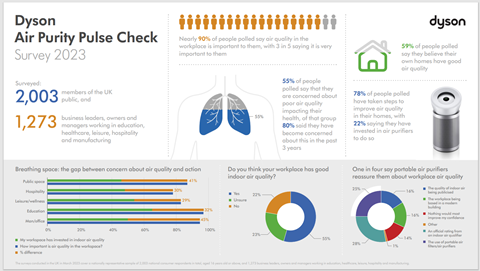The team’s study of 2,003 members of the public and 1,273 business owners and managers across multiple sectors delves into views on indoor air pollution

Dyson is launching the Air Purity Pulse Check report, a detailed dive into UK attitudes towards the importance of indoor air quality.
A worldwide issue recognised by the UK government as ‘the largest environmental risk to public health in the UK’, a study by Imperial College London found that 97% of UK homes exceed at least one of the World Health Organisation’s limits on three key air pollutants.
Dyson’s report found that over half of people polled are concerned about poor air quality impacting their health but only 59% believe their own homes have good air quality.
Younger, working-age respondents are more likely to be concerned about indoor air quality and of the 55% that shared their concerns about poor air quality’s impact on their health, 80% said they have become more concerned about this in the past three years.
People are taking steps with their indoor air quality at home, with 70% of people polled saying they have taken steps such as investing in air purifiers to improve home air quality.
Tim Jones CEng MIET, lead research engineer at Dyson, said: “Despite indoor air quality being much more prevalent in our lives, people are far more aware of the impacts of poor outdoor air quality. […] The past five years have changed our relationship with air quality, as we spend the majority of our time indoors. In particular, the public has been made much more aware of the air circulating in their indoor spaces, whether in a shared or private space. Despite its importance, indoor air pollution is largely invisible so has flown under the radar. This in-depth study illustrates the current views and opinions of the public and business owners, creating a ‘pulse check’ on the nation when it comes to indoor air quality.”

The majority (90%) of UK leaders, managers and owners believe that air quality in the workplace is important. This directly correlates with the public, with 90% saying that air quality in the workplace is important to them as well.
However, there is clearly a mismatch between what is considered important by decision-makers and what actions they are taking as only 65% of managers say that air quality in the workplace is a business priority, and half of people polled say that the organisations they work for have invested in indoor air quality.
The findings demonstrate that indoor air quality should be a business priority to aid staff wellbeing and retention. Two-thirds (66%) of people polled said they would be uncomfortable working somewhere with poor air quality and nearly half (46%) said air quality would be a consideration when deciding to take a job.
It is of no surprise that of the UK managers asked whether air quality is important to them in the workplace, the health sector managers came out on top (97%). Almost all (94%) health sector managers polled responded that air quality is a growing concern for them.
The report paints a clear picture that the awareness and importance placed on indoor air quality issues are moving in the right direction. However, there is still a long way to go to ensure the nation is prioritising the quality of the air that we breathe.















![Tarmac launches CEVO Asphalts Carbon Calculator for instant data on embodied carbon of asphalt mixes 02[87].jpg](https://d3rcx32iafnn0o.cloudfront.net/Pictures/100x67/9/7/6/2023976_tarmaclaunchescevoasphaltscarboncalculatorforinstantdataonembodiedcarbonofasphaltmixes0287.jpg_435882.jpg)
No comments yet